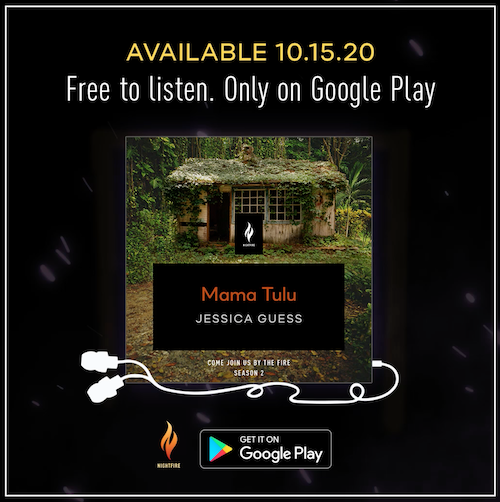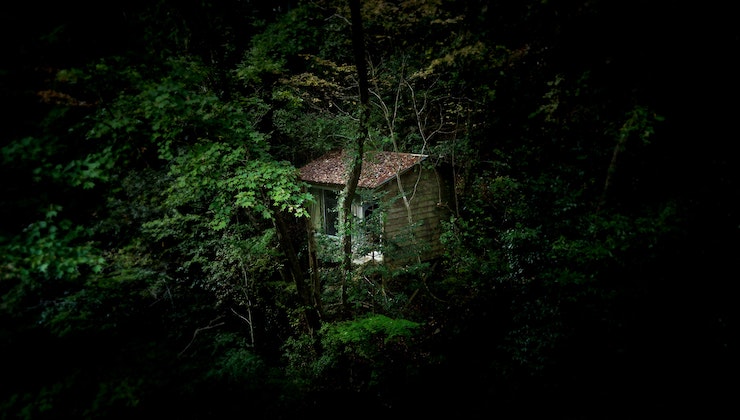sample heading
To celebrate the release of the second season of Come Join Us By The Fire, our audio horror anthology, we’ve asked authors with stories included in this year’s anthology to join us and write about horror. Below, Jessica Guess, whose story “Mama Tulu” you can listen to here, writes about family influence, curses, and how anger drives action.
I’m always interested in how writers come up with their story ideas, especially when it comes to horror. Did it come from an urban legend? A nightmare they had as a child? A scary family story their grandmother told them before bed? The possibilities for inspiration are endless, and when it comes to my own inspiration, I can’t say that it necessarily comes from one specific place. My story ideas are usually an amalgamation of all the things I mentioned above and more. One of my favorite stories, “Mama Tulu,” pulled from Jamaican lore, family history, and bedtime stories my mother told me as a child.
Obeah is the Jamaican term for what people in the United States call Voodoo. It’s a system of magic used for many purposes, including healing the sick, helping unlucky people find good fortune, and finding a spouse. Unfortunately, the tales of the positive aspects don’t usually make it into the interesting stories. Any mentions of Obeah in Jamaica have a dark and often deadly context.
When I was little, one of my favorite stories my mother told me was of something that happened to her and her sisters when they were little. My mother’s family is from a very small town in Manchester, Jamaica called Cross Keys. I’ve been there a few times, and if you can imagine the lush beauty of Jamaica—tall hills, banana trees, green foliage wherever you look—offset by reddish-colored dirt roads, potholes the size of watermelons, and houses that ranged from two-story mansions to one-room shacks, then you have a good idea of Cross Keys. The people of Cross Keys are kind, but this is a small town, and everyone knows one another. What’s more, everyone there is extremely religious and extremely superstitious.
When my mother was a little girl, maybe around nine or ten, she and her older sisters were some of the youngest girls in the area. Taking their father’s complexion, they were very light-skinned and had long hair that reached the middle of their backs. In a small town, it doesn’t take much to make your neighbors jealous. All you have to do is have a little more than they do. In addition to their looks, my mother and her sisters were doing very well in school, getting compliments from the teacher, yet another cause for contention.
One day, my mother’s older sister, Hazel, fell ill. She had a headache so bad that she couldn’t see. She had to be kept home from school. The next day, my mother’s sister Enid fell ill. She vomited and couldn’t keep any food down. She had to be kept home from school as well. The third day, my mother fell ill. She was dizzy and couldn’t walk without fainting. She, too, had to stay home from school.
None of them had fevers and no one else in the district was sick. In a town like this in Jamaica, this spells one thing and one thing only: Obeah.

My grandmother went to a local woman who was said to know about such things and how to fix them. She gave my grandmother a reading and told her that someone in the town was jealous of her daughters and didn’t want them to do well. She told my grandmother to go home. In her front yard, she needed to dig until she found three bottles. Whoever had done this to her children had planted the bottles there.
My grandmother went home and all day she spent digging up her front yard. Holes and dirt mounds covered the yard until she finally found it. Near the house, right under her daughters’ room, were three bottles, each filled with various liquids, her daughters’ hair, and other substances she couldn’t identify. My grandmother burned the bottles and her daughters recovered not long after. Ever since then, my mother and her sisters burned the hair that fell out when they combed it rather than sweeping it outside like they used to do.
These are the kinds of stories I grew up with. Tales of Obeah and dark magic that people could use to hurt you if they were angry or jealous enough. “Mama Tulu” sprang from all of this. In the stories I was told, there was usually a woman who worked the Obeah. You couldn’t do things like this yourself for various reasons.
Obeah workers are, in a sense, outcasts in that part of Jamaica. Obeah is still seen as evil and the people who use it are seen as dangerous. The hypocrisy of it, though, is that there are very few people who have never been to an Obeah worker for something or other—to find a husband, to ensure a job interview goes well, to curse a co-worker. Most people at least know of someone to ask for spiritual help with these kinds of things, though they don’t talk about it openly for fear of shunning.
With “Mama Tulu,” I thought about the worst thing a girl could want and what would drive her to seek help from an Obeah woman despite the social consequences that could befall her if people found out.
An image came to me of a girl walking through bushes at night with nothing but the moonlight to guide her. Each step was determined and filled with anger, but there was an assurance that her problem would be solved if she was willing to take this drastic step. I crafted Sasha after myself as a teenager, in love with a boy, but very angry at my father. I wanted her to feel desperate and fed up.
I also thought of a movie I watched as a kid, Eve’s Bayou, which is one of the few instances I’ve seen of Voodoo told through the eyes of Black people. I liked the idea of Eve not fully understanding what she was asking the Voodoo woman to do for her. I think there is a lesson there, in messing with forces you don’t understand. There are consequences you couldn’t have imagined.
I don’t think I could ever do what Sasha did in this story, but writing her was fun. It made me think of all the stories my aunts and mother told me as a kid and the tragedies that could befall you if you wrong the right person.
Jessica Guess is a writer and English teacher who hails from Fort Lauderdale, Florida. She is the founder of the website Black Girl’s Guide to Horror, where she examines horror movies in terms of quality and intersectionality. Her creative work has been featured in Luna Station Quarterly and Mused BellaOnline Literary Review. She loves anything horror but especially slashers and werewolves with maybe a bit of romance thrown in. Jessica will read or watch nearly anything with a black female protagonist. Her horror novella Cirque Berserk is available now.
Listen to Jessica’s story “Mama Tulu” on Google Play here, and listen the the entirety of the second season of Come Join Us By The Fire here.



